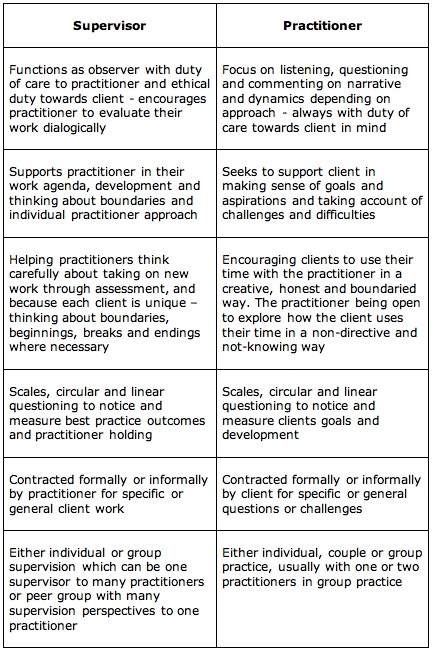Aims of Practitioner Supervision
The main aim of Practitioner Supervision is to encourage practitioners to be rigorously enquiring of their own practice potential on an on-going basis. Supervision establishes a relational forum which enables the practitioner to practice to high ethical and professional standards. This forum assists practitioners in further developing their skills through a knowledge and understanding of human functioning from perspectives other than their own.
The progressive relational forum functions in the following ways:
ReflectiveSupervision encourages practitioners to imagine how their clients view their own world. It helps the practitioner consider their clients' capacities to bring about changes they aspire to through goal setting. This is also an opportunity for the supervisor-practitioner alliance to consider session material in the context of current theories of mind development related to the practitioner's orientation.
ReflexiveReflexivity is the act of self-referencing; of looking back at oneself. It is a developmental opportunity for the practitioner to observe the dynamics experienced in the session, and how the client and practitioner both responded, albeit differently. Reflexivity is bidirectional, producing feedback as a result of the considerations taking place between supervisor and practitioner. The value of working with a trusted supervisor is that the practitioner furthers their knowledge and proficiency.
RefractionThoughts and ideas can begin to diverge into many meanings, and some of these meanings might be overlooked. The supervisory relationship aims to highlight possible meanings which might, otherwise, have been missed.
Retroactive LearningThe practitioner can review their clients' experiences and learn from them when they have sufficient time, or, during supervision, where other resources from dialogue become available. It may not always be possible for the practitioner to understand a communication from their clients when it occurs. When the practitioner reports to the supervisor, they are potentially able to think creatively about the clients' communications for the practitioner's better understanding.
ConsultativeConsultative dialogue helps improve efficiency and transparency with regard to industry standards and a practitioner-elected code of ethics. Consultation is a dialogical flow of opinion, information, and knowledge-exchange which better informs the practitioner.
DialogicalSupervision operates dialogically through conversation, discussion, and debate between supervisor and practitioner. The act of supervision creates introspection and evaluation in the practitioner.
NormativeEach practitioner is a product of their training and development. Standards, ethics and practice are ever evolving concepts. The supervisory relationship supports the practitioner with feedback and self-assessment.
TeleologicalSupervision is goal orientated and has a purposive, forward looking function for the practitioner. A teleological view encourages practitioners to think where they have come from, taking stock of where they find themselves, and thinking about their future.
Skill and Technical AgilityPractitioner skill develops with experience and on-going investment in self-development. The supervisor-practitioner space is a useful environment for the practitioner to develop their skills via theoretical discussion, role play, role reversal experiential debate, or everyday conversation.
Comparison between Supervisor and Practitioner Aims

